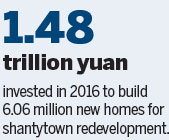By the end of 2017, China will secure full delivery of 18 million new homes for rundown urban areas as part of a three-year program.
The matter was deliberated at a State Council executive meeting that Premier Li Keqiang presided over on Wednesday. Li defined the campaign as a major component of supply-side structural reform and a strong push to improve quality of life and development.
"Our institutional advantages have been demonstrated over the past eight years as the campaign has achieved fruitful outcomes and a set of good practices," he said.
The government invested 1.48 trillion yuan ($217 billion) in 2016 to build 6.06 million new homes for shanty redevelopment, according to the Ministry of Housing and Urban-Rural Development.
In his Government Work Report in March, the premier vowed to revamp 6 million housing units this year and continue to develop rentals and other forms of government-subsidized housing. He also promised better delivery of financial compensation, combining multiple assistance for relocated families while improving infrastructure and public services.
From January to April, the country completed 36 percent of this year's goal by starting construction of 2.19 million housing units.

On Wednesday, it was decided to make solid progress in new redevelopment in quality and in speed on par with last year. New phases of existing projects are to be finished as early as possible. More relocated families will get compensation in monetary form, especially in third- and fourth-tier cities, to help reduce housing inventories. Amenities and public services such as schools and hospitals will be improved. Management will be strengthened to control costs as local governments are urged to make the best of earmarks and prevent embezzlement.
Li urged ensuring construction quality, supporting facilities and housing allocations. "We want the families that move into their new homes to enjoy their new lives as early as possible," he said.
A follow-up plan will be made to grant stronger support for the redevelopment program from 2018 to 2020, the last step in building new homes for about 100 million people who used to live in shantytowns and urban villas.
"China's industrialization and urbanization is a lasting effort. We have many people that are yet to move to the cities and start new lives. We should remain unrelenting in our efforts to live up to the people's expectations," Li said.
